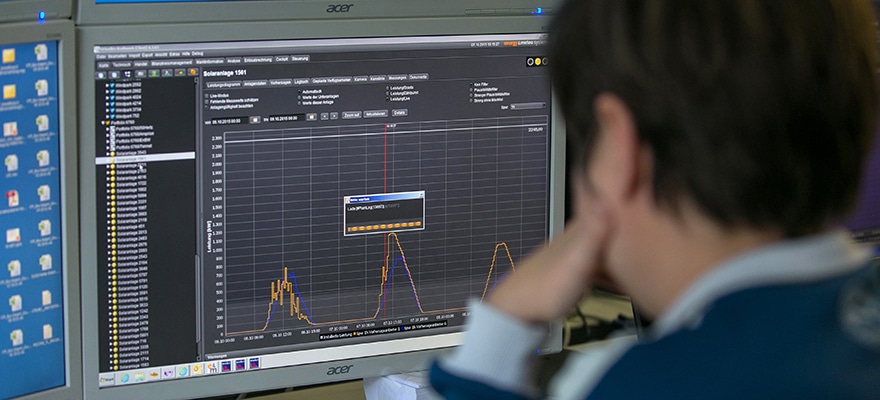A leading provider of regulatory compliance technology solutions, Gresham Computing Plc, listed in the UK under ticker GHT.L, speaks with Finance Magnates during an exclusive interview with the company’s Chief Technology Officer Neil Vernon, and Global Business Development Director Bill Blythe.
The company has offices in New York, London, Sydney, and Singapore, and a nearly £65 million market capitalisation based on its current stock price of 102.50 GPX per share on the London Stock Exchange (LSE). It reported earnings earlier this month showing 16% increases Year-over-Year to £14.8 million with recurring revenues up 20% to £7.8 million.
During the call, Mr. Blythe explained the company's approach in terms of sales efforts and commercial structure, recent customer acquisitions, and together with Gresham's CTO Neil Vernon elaborated on the existing challenges within the current regulatory landscape globally.
Mr. Vernon manages a team of nearly forty developers who work on the company’s product suite including its Clareti Transaction Control (CTC) staple offering. Mr. Blythe has been with the firm since 2012 and is involved in nearly every deal.
Markets still not transparent

Bill Blythe
Source: Gresham
There is still a lot of legacy infrastructure across institutions that when combined create further fragmentation of the trade life cycle. One analogy used was how a FedEx package shipped for $10 across the Atlantic could be tracked every step of the way, while a transatlantic financial markets trade for even $100 million could have less granular detail with regard to where it is in the trade process as financial institutions still have fragmented systems and external relationships.
This also reflects fragmentation in the underlying markets, such as US Equity markets, so the analogy made sense.
More literally, another example given was how they could ask a large dealer about its exposure to a specific company, such as Blackrock, within a segment of the dealers business, and while they could report on that, there's normally no mechanism to report exposure across all divisions and holdings to a specific underlying security or fund, as there can be overlap and fragmentation within firms due to the sheer number of routes and clearing relationships and technology channels, among other issues that can add to the complexity of accurate net reporting.
RegTech importance
Overall, transparency, accountability and market integrity continue to be the key driving themes behind the continually evolving regulatory changes. Therefore, compliance to these rules by regulated firms becomes more important, and operationally significant as well as costly, necessitating in-house and outsourced technology.
"We are closely aligned with FINRA and other European regulatory bodies on specific regulatory directives."
Gresham handles some large accounts and associated trading needs for its capital market clients, including for banks, insurance companies, and exchanges such as the CME Group, as well as multi-asset online brokers including CMC Markets. For example, it processes 3 million transactions per day in real-time for one of the tier 1 banks it caters to, while handling nearly 180 million batch transactions overnight.
Data and integration needs
The transactions could be anything from updating parameters or data fields on behalf of a customer, as information gets updated from financial movements within an account or affected by the market, among other types, and highlights the robust nature of the company’s platform.
"This process occurs at bank grade speed - 500,000 trades processed per second."
With regard to regulatory compliance, some of the real-time screening Gresham does while processing trading activity includes scanning for fraudulent trades such as those that are committed by rogue traders who often go to great lengths to hide such activity until it's too late.

Neil Vernon
Source: Gresham
When Mr. Vernon explained how the company undergoes its integration process with a firm, he said that the use of heuristic engines helps automatically determine the data types and mark them for appropriate categorization, rather than having to manually map each data type to the corresponding place within Gresham’s platform.
In response to questions regarding the protocol’s offered, Mr. Vernon said that Gresham uses an integration engine called Spring that handles all the common protocols including FIX and REST APIs, HTTP, and other methods.
Basically, once the data is sent to Gresham, there is no mapping as the company figures that side out on its own using the above mentioned heuristic engine, which will get it right most of the time (with the remainder done manually), as explained during the discussion.
Complex event processing
Around the time of the interview, I had noticed that Mr. Vermon’s prior roles included work with Complex Event Processing (CEP), which is basically combining qualitative (event) data into an existing algorithmic (quantitive) approach or vice versa. Essentially, a trading strategy that could also take into account news, and how such "events" would together affect the strategy or require it to adjust its course of action.
After asking about any relationship between the firms heuristic engine and CEP, Mr. Vernon said: “Our engine borrows from many aspects of CEP (Complex Event Processing). It receives events in real-time and is able to aggregate events and group events together. It is also able to filter out irrelevant events. Business rules can run over single, aggregated and grouped events and determinations made about whether there is a data integrity issue. Issues found by the engine are then managed through workflow and integration with upstream and downstream systems in a similar way to how CEP engines typically couple with BPM (Business Process Management) tools. This process occurs at bank grade speed - 500,000 trades processed per second."
Such a smart approach applied to the integration of the company’s heuristic engine appears to have helped it become more scalable with on-boarding clients. For example, one of its largest clients was able to migrate to a new system over a weekend thanks to Gresham processing 1.5 billion transactions to facilitate the migration into the new database.
Staying up to speed on regulatory change
While the company provides its solutions globally, including to firms in the US, and Singapore, among others, it also provided solutions for CME Group’s European efforts related to EMIR. Gresham offers a subscription based license that is determined by consumption, which can be determined based on any of several metrics such as users or trading volumes, among other schemes available for commercial terms.
During the conference call the company's Global Business Development Director Bill Blythe said: "We are closely aligned with FINRA and other European regulatory bodies on specific regulatory directives. We have recently signed a couple of large hedge funds in CT and NY, with an industry-wide focus on enterprise data integrity including the trade and transaction reporting aspects, across the European, North American and APAC regions; it's an integral and key part of our business."
Finance Magnates has previously written about Gresham when one of its board members joined Fidessa's board.






















